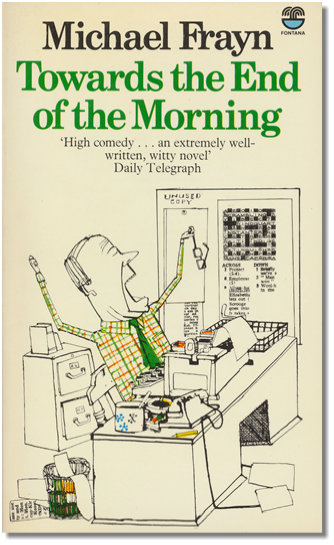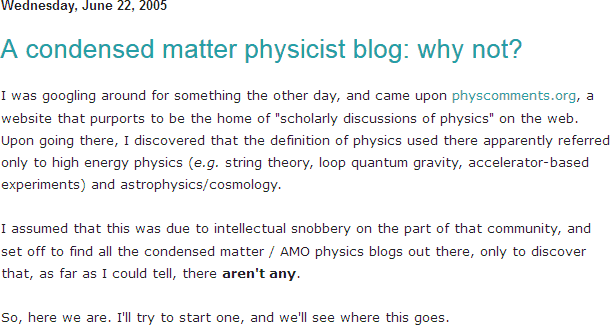2015 — 19 January: Monday
The fact that it's barely -1C out on my front porch suggests yesterday's dire weather warnings and pessimistic prognostications1 were wide of the mark. Mind you, it's a bracing 19.1C in my living room. I tend not to notice that while unfashionably multi-layered. Or well topped-up with fresh tea.
What I do notice is that this is Day 2999 of my retirement, which is kinda cool. I shall celebrate with some breakfast in due course.
I often wonder...
... why magazines that go to all the trouble of commissioning and publishing articles as interesting as this even bother to allow comments when what one might call members of the "God Squad" arrive bearing their pitchforks and flaming torches (or do I mean "burning bushes"?). Source and snippet:
[Karthik Raman] ... has studied much the same issues of functional equivalence of different circuits not for genes but for electronic components that carry out binary logic functions. By randomly rewiring circuits of 16 components and figuring out which of them will perform particular logic operations, Raman found that they too have this evolvable topology. But crucially, this property appeared only if the circuits were complex enough — if they had too few components, small changes destroyed their function. "The more complex they are, the more rewiring they tolerate," says Wagner. Not only does this open up possibilities for electronic circuit design using Darwinian principles, but it suggests that evolvability, and the corollary of creativity or innovability, is a fundamental feature of complex networks like those found in biology.
I expect it will be time to start worrying when I notice logic gates growing little legs and wandering around BlackBeast's motherboard. Like the man said: "if our brains2 were simple enough to understand, we would be too simple to understand them".
Another...
... long and thoughtful essay. This one's on Cass Sunstein, a proponent (among much else) of nudging people to change their behaviour. If it goes on like this I shall arrive at lunchtime with no breakfast inside me. Source and snippet:
In recent decades, behavioral economists have shown that, out of impulse, impatience, or ignorance, people often make choices that are not the best or even good for them: we are not the rational self-interest maximizers that conventional economists have
long assumed...
The dangerous ideas that most concern him are errors in thinking akin to crippled epistemology that lead to foolish or damaging behavior. They include misfearing, "when people are afraid of trivial risks and neglectful of serious ones,"
so public funding is misallocated to combat the former instead of the latter, and the availability heuristic, a mental shortcut in thinking about risk that is influenced by heavily publicized events (floods, forest fires) so people worry about
the wrong perils.
Now ain't that the truth!
I have a...
... namesake: "the appalling Reg Mounce". He is the Pictures Editor of a not very modern national newspaper in Michael Frayn's 1967 satire...

... an extract from which also appears in the 1998 anthology "The Vintage Book of Office Life" — a book I clearly bought on some long-forgotten masochistic impulse (possibly related to my incarceration, at the time, in an IBM office?). I was reminded of this by hearing Mr Frayn — this week's guest "chatterer" for some of the bits in between the music on the BBC's 'Essential Classics' programme.
In earlier times I used to wonder which of my relatives, if any, had been the one to have clambered up Frayn's nose. Of course, I now realise that the art of selecting names for fictional use is fraught with litigational potholes.
Aside to Christa
As Eastleigh's 'Swan Centre' follows the High Street and Market Street shops into the black hole of commercial oblivion, my little man's fee for fitting a new watch battery has now passed the £4 mark, going up. Had I paid any attention to the change I received, or the cost of the car park, or the amount of loose change for the car park that I'd put into my pocket before I set off, I could be more precise.
Having finished...
... and very much enjoyed Shubin's book, I was glancing through the amusing notes and sources in the back, and was delighted to find this "Webified" PDF version of a reprint of a (slightly edited) paper by EM Purcell: "Life at Low Reynolds Number". The original talk dates back to June 1976. (Original published paper from the American Journal of Physics, Vol 45, No. 1, January 1977 — PDF file.)
Bear in mind that "some essential hand waving could not be reproduced" :-)
At this point, I wish I could persuade you that the direction in which this helical drive will move is not obvious. Put yourself back in that swimming pool under molasses and move around very, very slowly. Your intuitions about pushing water backwards are irrelevant. That's not what counts. Now, unfortunately, it turns out that the thing does move the way your naive, untutored, and actually incorrect argument would indicate, but that's just a pedagogical misfortune we are always running into.
Just wonderful stuff. And, should you be wondering, Reynolds Number loomed quite large in the experimental phase of my life as an aeronautical engineering student. I have never used it, or needed it, since February 1974, however.
I found the link to...
... EM Purcell's published paper via a very engaging nanoscale physics blog that Douglas Natelson kicked off a while back with this nice manifesto:
Of course, I now find myself wondering how much a condensed matter physicist weighs...
